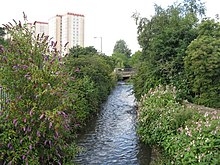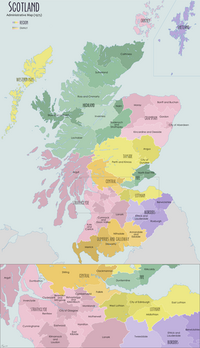Lothian
55°54′33″N 3°05′04″W / 55.90917°N 3.08444°W
Lothian | |
|---|---|
 | |
| Country | Scotland |
| Area | |
| • Total | 1,720 km2 (666 sq mi) |
| Population (2014)[1] | |
| • Total | 858,090 |
| • Density | 497/km2 (1,288/sq mi) |


Lothian (
Historically, the term Lothian referred to a
Subsequent Scottish history saw the region subdivided into three counties—Midlothian, East Lothian, and West Lothian—leading to the popular designation of "the Lothians".
Etymology
The origin of the name is debated. It perhaps comes from the British *Lugudūniānā (Lleuddiniawn in Modern Welsh spelling), meaning "country of the fort of Lugus", the latter being a Celtic god of commerce.[4] Alternatively, it may take its name from a watercourse that flows through the region, now known as the Lothian Burn,[note 1] the name of which comes from either the British lutna meaning "dark or muddy stream,"[note 2][5] *lǭd, with a meaning associated with flooding (c.f. Leeds),[6] or lǖch, meaning "bright, shining."[6]
A popular legend is that the name comes from
Angle settlement
Lothian was settled by Angles at an early stage and formed part of the Kingdom of Bernicia, which extended south into present-day Northumberland and Durham. Many place names in the Lothians and Scottish Borders demonstrate that the English language became firmly established in the region from the sixth century onwards. In due course, Bernicia united with
Little is recorded of Lothian's history specifically at this time. After the
Language
In the post-Roman period, Lothian was dominated by British-speakers whose language is generally called Cumbric and was closely related to Welsh. In Welsh tradition Lothian is part of the "Old North" (Hen Ogledd). Reminders exist in British place-names like Tranent, Linlithgow and Penicuik.[13]
During the Anglo-Saxon period, the Northumbrian dialect of Old English came to be spoken in the region. Initially confined to Lothian and the Borders, the language would grow, change, and spread across the lowlands of Scotland, becoming the Scots language. The dialects of the modern Lothians are usually considered to be part of Central Scots. Place names in the Lothians of Anglian origin include Ingliston.[14]
Although one of the few areas of mainland Scotland where the
Governance
By 1305, the area of Lothian had been divided into three shires (the area controlled by a sheriff), called the shires of Edinburgh (or Edinburghshire), Haddington (or Haddingtonshire), and Linlithgow (or Linlithgowshire).[17] Each of these three counties had an informal alternative name referencing their position within the former province of Lothian: Edinburghshire was also known as Midlothian, Haddingtonshire as East Lothian, and Linlithgowshire as West Lothian. The city of Edinburgh was made a county of itself in 1482, making it administratively independent from the surrounding county of Edinburghshire.[17]
The three Lothian counties were all legally renamed during the twentieth century, with Haddingtonshire becoming East Lothian in 1921,[18] Linlithgowshire becoming West Lothian in 1925,[19] and Edinburghshire becoming Midlothian in 1947.[20]

In 1975 the old county councils and burgh corporations were abolished under the
Lothian Regional Council was abolished in 1996 under the
Political control
The first election to the Lothian Regional Council was held in 1974, initially operating as a shadow authority alongside the outgoing authorities until the new system came into force on 16 May 1975. Political control of the council from 1975 until its abolition in 1996 was as follows:[25]
| Party in control | Years | |
|---|---|---|
| No overall control | 1975–1978 | |
| Labour | 1978–1982 | |
| No overall control | 1982–1986 | |
| Labour | 1986–1996 | |
Notes
- ^ Also known as the Burdiehouse, Niddrie, or Brunstane Burn as it passes through those neighbourhoods.
- ^ In contrast to the nearby Peffer Burn, the name of which comes from pefr, 'clear stream'.
References
- ^ "Estimated population by sex, single year of age and administrative area, mid-2014" (PDF). National Records of Scotland. Retrieved 17 May 2015.
- ^ "Dictionary of the Scots Language :: SND :: Lowden prop. n". Dsl.ac.uk. Retrieved 26 May 2016.
- ^ "Ancient Lothian Timeline". Cyberscotia.net. Archived from the original on 21 August 2010. Retrieved 19 August 2009.
- ^ Koch, John, Celtic Culture, ABC-CLIO, 2006, p. 1191.
- ^ ISBN 978-1-904246-06-0.
- ^ a b James, Alan. "A Guide to the Place-Name Evidence" (PDF). SPNS – The Brittonic Language in the Old North. Archived from the original (PDF) on 13 August 2017. Retrieved 25 November 2018.
- ^ "Important Anglo Saxon remains discovered in East Lothian". www.historyscotland.com. Archived from the original on 7 November 2017. Retrieved 18 March 2018.
- ISBN 0-521-81335-2.
- ^ Mack, Logan, (1924) "The Border Line - Solway Firth to the North Sea", Oliver & Boyd, p. 6
- ^ Anglo-Saxon Chronicle
- ISBN 978-1-4718-3657-2– via Google Books.
- ^ McGuigan, Neil (2015). "Neither Scotland nor England: Middle Britain, c.850-1150" (PDF). University of St Andrews.
King Máel-Coluim 'went with his army out of Scotland into Lothian in England' (ut of Scotlande into Loðene on Englaland) to parley
- ^ a b "Ancient Lothian". Cyberscotia.net. Archived from the original on 5 December 2010. Retrieved 22 February 2007.
- ISBN 9780244644406.
- ^ Craig Cockburn (2 November 2005). "Gaelic roots need to be unearthed". BBC News.
- ISBN 978-0-85976-556-5.
- ^ a b Chalmers, George (1889). "Edinburghshire: Of its establishment as a shire". Caledonia. Paisley: Alexander Gardner. pp. 559, 574, 579. Retrieved 24 December 2022.
- ^ "East Lothian County Buildings Order Confirmation Act 1921", legislation.gov.uk, The National Archives, 1921 c. 123, retrieved 25 December 2022
- ^ "Westlothian (Bathgate District) Water Order Confirmation Act 1925", legislation.gov.uk, The National Archives, 1925 c. 10, retrieved 25 December 2022
- ^ "Local Government (Scotland) Act 1947", legislation.gov.uk, The National Archives, 1947 c. 43, retrieved 24 December 2022
- ^ Historic Environment Scotland. "Midlothian County Buildings, George IV Bridge, Edinburgh (LB27674)". Retrieved 3 July 2022.
- ^ "History of Local Government in Scotland". Scottish Government. Retrieved 28 January 2022.
- ^ Councils in Scotland to face shake-up, The Times. 9 July 1993.
- ^ "Local Government etc. (Scotland) Act 1994", legislation.gov.uk, The National Archives, 1994 c. 39, retrieved 16 December 2022
- ^ "Compositions calculator". The Elections Centre. Retrieved 26 December 2022.
External links
 Media related to Lothian at Wikimedia Commons
Media related to Lothian at Wikimedia Commons- Herman Moll's map of the Lothian shires (c.1745)
- Lothian Buses
- NHS Lothian


